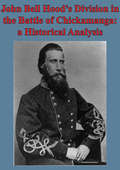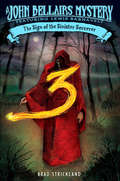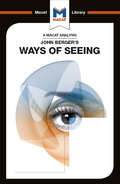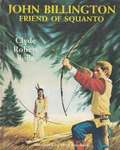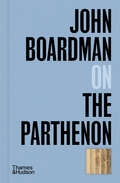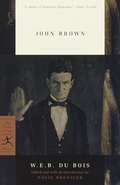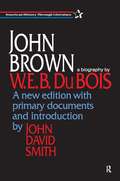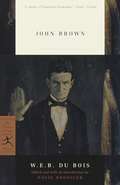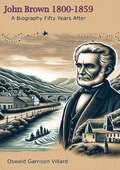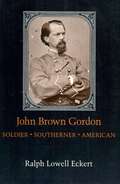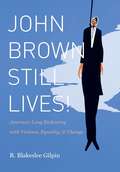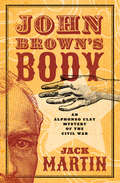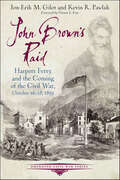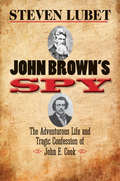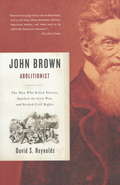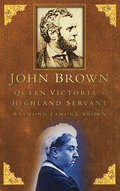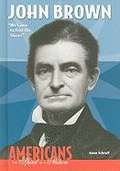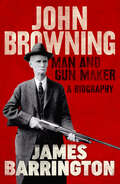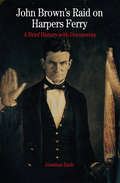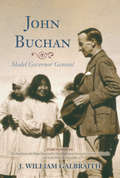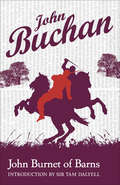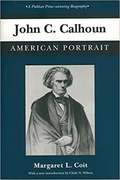- Table View
- List View
John Bell Hood’s Division In The Battle Of Chickamauga: A Historical Analysis [Illustated Edition]
by Major Kyle J. FoleyIllustrated with 23 maps and plans of the campaign and engagements at Chickamauga.This thesis is a historical analysis and assessment of Major General John Bell Hood's Division during the Battle of Chickamauga. In early July 1863, the Confederate Army suffered two major defeats, Vicksburg and Gettysburg, where the division suffered many casualties, including Hood. Hood's Division earned a reputation as the best division in the Army of Northern Virginia. This division was selected to reinforce General Braxton Bragg's Army of Tennessee, and his campaign to defeat the Federal Army of the Cumberland, under the command of Major General William Rosecrans. Their reputation preceded them with high expectations. Chickamauga was the division's first major battle in the western theater.The thesis begins with brief pre-Chickamauga biographies of Hood and his brigade commanders; Brigadier General Evander McIver Law, Brigadier General Henry L. Benning, and Brigadier General Jerome B. Robertson. Next, the circumstances that brought the division to the Battle of Chickamauga and their journey to northern Georgia will be discussed. Thereafter, a close examination of the engagements conducted from 18-20 September 1863 will be discussed. Finally, an analysis will be presented to how the leaders of Hood's Division performed during the Battle of Chickamauga, and draws conclusions as to the proximate causes of their performances. These causes focus on the divisional leaders and their decisions.
John Bellairs Mystery: The Sign of the Sinister Sorcerer
by Brad StricklandLewis's hopes for a peaceful summer vacation are shattered as one accident after another plagues him. Is all his bad luck really just a coincidence? Or does it have something to do with the mysterious hooded figure he keeps seeing?
John Berger's Ways of Seeing (The Macat Library)
by Emmanouil KalkanisWays of Seeing is a key art-historical work that continues to provoke widespread debate. It is comprised of seven different essays, three of which are pictorial and the other containing texts and images. Berger first examines the relationship between seeing and knowing, discussing how our assumptions affect how we see a painting. He moves on to consider the role of women in artwork, particularly regarding the female nude. The third essay deals with oil painting looking at the relationship between subjects and ownership. Finally, Berger addresses the idea of ownership in a consumerist society, discussing the power of imagery in advertising, with particular regards to photography.
John Billington, Friend of Squanto
by Clyde Robert BullaA young Pilgrim boy is always causing trouble for Plymouth Colony until one day his mischief results in more friendly relations with the Indians.
John Boardman on the Parthenon (Pocket Perspectives #2)
by John BoardmanBritain's most distinguished historian of ancient Greek art recounts what the Parthenon and its sculptures meant to the citizens of fifth-century BCE Athens. Surprising, questioning, challenging, enriching: the Pocket Perspectives series presents timeless works by writers and thinkers who have shaped the conversation across the arts, visual culture, and history. Celebrating the undiminished vitality of their ideas today, these covetable and collectable little books embody the best of Thames & Hudson.
John Brown
by W. E. B. Du BoisContains the original (1909) edition of the text and six related documents. The life of one of America's most well-known and controversial abolitionists is examined by one of its most brilliant black intellectuals and activists. Du Bois (1868-1963) defended Brown from accusations as a demagogue and radical, suggesting that his greatest crime was that he demanded freedom for the oppressed.
John Brown
by W. E. DuBoisFirst published in 1909, W.E.B. Du Bois's biography of abolitionist John Brown is a literary and historical classic. With a rare combination of scholarship and passion, Du Bois defends Brown against all detractors who saw him as a fanatic, fiend, or traitor. Brown emerges as a rich personality, fully understandable as an unusual leader with a deeply religious outlook and a devotion to the cause of freedom for the slave.This new edition is enriched with an introduction by John David Smith and with supporting documents relating to Du Bois's correspondence with his publisher.
John Brown (Modern Library Classics)
by W. E. B. Du Bois David R. RoedigerA moving cultural biography of abolitionist martyr John Brown, by one of the most important African-American intellectuals of the twentieth century. In the history of slavery and its legacy, John Brown looms large as a hero whose deeds partly precipitated the Civil War. As Frederick Douglass wrote: "When John Brown stretched forth his arm ... the clash of arms was at hand." DuBois's biography brings Brown stirringly to life and is a neglected classic.
John Brown 1800-1859: A Biography Fifty Years After
by Oswald Garrison Villard“The present volume is inspired by a belief that fifty years after the Harper's Ferry tragedy, the time is ripe for a study of John Brown, free from bias, from the errors in taste and fact of the mere panegyrist, and from the blind prejudice of those who can see in John Brown nothing but a criminal. The pages that follow were written to detract from or champion no man or set of men, but to put forth the essential truths of history as far as ascertainable, and to judge Brown, his followers and associates in the light thereof.”-Preface.John Brown (May 9, 1800 – December 2, 1859) was a prominent leader in the American abolitionist movement in the decades preceding the Civil War. First reaching national prominence in the 1850s for his radical abolitionism and fighting in Bleeding Kansas, Brown was captured, tried, and executed by the Commonwealth of Virginia for a raid and incitement of a slave rebellion at Harpers Ferry in 1859.In October 1859, Brown led a raid on the federal armory at Harpers Ferry, Virginia (which became West Virginia), intending to start a slave liberation movement that would spread south; he had prepared a Provisional Constitution for the revised, slavery-free United States that he hoped to bring about. He seized the armory, but seven people were killed and ten or more were injured. Brown intended to arm slaves with weapons from the armory, but only a few slaves joined his revolt. Those of Brown's men who had not fled were killed or captured by local militia and U.S. Marines, the latter led by Robert E. Lee. Brown was tried for treason against the Commonwealth of Virginia, the murder of five men, and inciting a slave insurrection. He was found guilty of all charges and was hanged on December 2, 1859, the first person executed for treason in the history of the United States.
John Brown Gordon: Soldier, Southerner, American (Southern Biography Series)
by Ralph Lowell EckertJohn Brown Gordon is a biography of the southern man from his birth in Upson County, Georgia, entrepreneur, Confederate soldier, political careers, to writing memoirs in his final years. The biography is based on newspapers, manuscripts, and official records.
John Brown Still Lives!
by R. Blakeslee GilpinFrom his obsession with the founding principles of the United States to his cold-blooded killings in the battle over slavery's expansion, John Brown forced his countrymen to reckon with America's violent history, its checkered progress toward racial equality, and its resistance to substantive change. Tracing Brown's legacy through writers and artists like Thomas Hovenden, W. E. B. Du Bois, Robert Penn Warren, Jacob Lawrence, Kara Walker, and others, Blake Gilpin transforms Brown from an object of endless manipulation into a dynamic medium for contemporary beliefs about the process and purpose of the American republic.Gilpin argues that the endless distortions of John Brown, misrepresentations of a man and a cause simultaneously noble and terrible, have only obscured our understanding of the past and loosened our grasp of the historical episodes that define America's struggles for racial equality. By showing Brown's central role in the relationship between the American past and the American present, Gilpin clarifies Brown's complex legacy and highlights his importance in the nation's ongoing struggle with the role of violence, the meaning of equality, and the intertwining paths these share with the process of change.
John Brown and the Era of Literary Confrontation (Studies in American Popular History and Culture)
by Michael StonehamRadical abolitionist and freedom-fighter John Brown inspired literary America to confrontation during his short but dramatic career as a public figure in antebellum America. Emerging from obscurity during the violent struggle to determine how Kansas would enter the Union in 1856, John Brown captured the imagination of the most prominent Eastern literary figures following his dramatic, though failed raid on Harper’s Ferry. Impressed by Brown’s forthright defense of his attempt to initiate the end of slavery, Whittier, Whitman, Melville, Longfellow, and Howells responded to the abolitionist with poetic tributes suggesting that Brown was a liberating hero, while Emerson and Thoreau celebrated his effort to inspire the nation to a new moral awareness of the common humanity of all men. Responses, however, were not uniform, as these and other figures debated the merits and meanings of Brown’s actions. This exceptional book sheds new light on how John Brown inspired America’s most significant intellects to take a public stand against the inertia of moral compromise and social degeneracy, bringing the nation to the brink of civil war.
John Brown's Body (Alphonso Clay Mysteries of the Civil War)
by Jack MartinA man investigating treason is assassinated, and the case must be solved by a &“brilliant and haunted Southerner&” working for the Union Army (RP Dahlke, author of the Dead Red Mysteries). Cpt. Alphonso Clay had been summoned to meet John Brown—not that John Brown, but a former Boston detective recruited by Abe Lincoln to put his skills to work in the war effort. Brown has now ferreted out treachery among powerful military figures . . . but he&’s killed before he can meet with Clay. Now Clay&’s only hope is to decipher Brown&’s cryptic notes and follow his deductive instincts to solve the murder, unmask the traitors, and ensure the Union&’s victory at Vicksburg . . .
John Brown's Raid on Harpers Ferry (Cornerstones of Freedom)
by Brendan JanuaryOn October 16, 1859, John Brown led an "army" of eighteen men to an attack on Harpers Ferry, Virginia (now West Virginia). Brown's hope was to cause a slave rebellion in the surrounding area, which would spread throughout the South. Escaped slaves would then establish their own free state in the Allegheny Mountains, which are part of the Appalachian Mountain system and stretch from Virginia into Pennsylvania. Brown's raid was unsuccessful -- he was captured, tried for crimes against the State of Virginia, convicted, and hung by the end of that year. However, he succeeded in his desire to bring about a definitive answer to the "question" of slavery. His raid on Harpers Ferry deepened the division between northerners who opposed slavery and southerners who wished to preserve their way of life.
John Brown's Raid: Harpers Ferry and the Coming of the Civil War, October 16-18, 1859 (Emerging Civil War Series)
by Kevin R. Pawlak Jon-Erik M. GilotThe first shot of the American Civil War was not fired on April 12, 1861, in Charleston, South Carolina, but instead came on October 16, 1859, in Harpers Ferry, Virginia—or so claimed former slave turned abolitionist Frederick Douglass. The shot came like a meteor in the dark. John Brown, the infamous fighter on the Kansas plains and detester of slavery, led a band of nineteen men on a desperate nighttime raid that targeted the Federal arsenal at Harpers Ferry. There, they planned to begin a war to end slavery in the United States. But after 36 tumultuous hours, John Brown’s Raid failed, and Brown himself became a prisoner of the state of Virginia. Brown’s subsequent trial further divided north and south on the issue of slavery as Brown justified his violent actions to a national audience forced to choose sides. Ultimately, Southerners cheered Brown’s death at the gallows while Northerners observed it with reverence. The nation’s dividing line had been drawn. Herman Melville and Walt Whitman extolled Brown as a “meteor” of the war. Roughly one year after Brown and his men attacked slavery in Virginia, the nation split apart, fueled by Brown’s fiery actions. John Brown’s Raid tells the story of the first shots that led to disunion. Richly filled with maps and images, it includes a driving and walking tour of sites related to Brown’s Raid so visitors today can follow the path of America’s meteor.
John Brown's Spy: The Adventurous Life and Tragic Confession of John E. Cook
by Steven LubetA &“compulsively readable&” account of the fugitive who betrayed John Brown after the bloody abolitionist raid on Harper&’s Ferry (Booklist, starred review).John Brown&’s Spy tells the nearly unknown story of John E. Cook, the person John Brown trusted most with the details of his plans to capture the Harper&’s Ferry armory in 1859. Cook was a poet, a marksman, a boaster, a dandy, a fighter, and a womanizer—as well as a spy. In a life of only thirty years, he studied law in Connecticut, fought border ruffians in Kansas, served as an abolitionist mole in Virginia, took white hostages during the Harper&’s Ferry raid, and almost escaped to freedom. For ten days after the infamous raid, he was the most hunted man in America with a staggering one-thousand dollar bounty on his head.Tracking down the unexplored circumstances of John Cook&’s life and disastrous end, Steven Lubet is the first to uncover the full extent of Cook&’s contributions to Brown&’s scheme. Without Cook&’s participation, the author contends, Brown might never have been able to launch the insurrection that foreshadowed the Civil War. Had Cook remained true to the cause, history would have remembered him as a hero. Instead, when Cook was captured and brought to trial, he betrayed John Brown and named fellow abolitionists in a full confession that earned him a place in history&’s tragic pantheon of disgraced turncoats.&“Lubet is especially effective at capturing the courtroom drama . . . A crisply told tale fleshing out one of American history&’s more intriguing footnotes.&” —Kirkus Reviews&“Take[s] readers on a ride through the frantic days surrounding Brown&’s raid that will make them &‘feel&’ the moment as much as understand it.&” —Library Journal (starred review)
John Brown, Abolitionist: The Man Who Killed Slavery, Sparked the Civil War, and Seeded Civil Rights
by David S. ReynoldsAn authoritative new examination of John Brown and his deep impact on American history.Bancroft Prize-winning cultural historian David S. Reynolds presents an informative and richly considered new exploration of the paradox of a man steeped in the Bible but more than willing to kill for his abolitionist cause. Reynolds locates Brown within the currents of nineteenth-century life and compares him to modern terrorists, civil-rights activists, and freedom fighters. Ultimately, he finds neither a wild-eyed fanatic nor a Christ-like martyr, but a passionate opponent of racism so dedicated to eradicating slavery that he realized only blood could scour it from the country he loved. By stiffening the backbone of Northerners and showing Southerners there were those who would fight for their cause, he hastened the coming of the Civil War. This is a vivid and startling story of a man and an age on the verge of calamity.From the Trade Paperback edition.by the slave revolts, guerilla warfare, and revolutionary Christianity of the day. He shows us how Brown seized the nation's attention, creating sudden unity in the North, where the Transcendentalists led the way in sanctifying Brown, and infuriating the South, where proslavery fire-eaters exploited the Harpers Ferry raid to whip up a secessionist frenzy. In fascinating detail, Reynolds recounts how Brown permeated politics and popular culture during the Civil War and beyond. He reveals the true depth of Brown's achievement: not only did Brown spark the war that ended slavery, but he planted the seeds of the civil rights movement by making a pioneering demand for complete social and political equality for America's ethnic minorities. A deeply researched and vividly written cultural biography-a revelation of John Brown and his meaning for America.From the Hardcover edition.
John Brown: Queen Victoria's Highland Servant
by Raymond Lamont-BrownA century after Queen Victoria's death, debate still rages surrounding her relationship with her gillie, John Brown. Were they ever married? What was the extraordinary hold he had over her? This biography aims to shed new light on these questions and to discover the truth behind Brown's hold on his royal employer. Following the death of Prince Albert in 1861, the Queen found solace in the companionship of John Brown, who had commenced his royal employment as a stable hand. He became "The Queen's Highland Servant" in 1865 and rose to be the most influential member of the Scottish Royal Household. While the Queen could be brusque and petulant with her servants, family and minsters, she submitted to Brown's fussy organisation of her domestic life, his bullying and familiarity without a murmur. Despite warnings of his unpopularity with her subjects by one Prime Minister, the Queen was adamant that Brown would not be sacked. The Queen's confidence was rewarded when Brown saved her from an assassination attempt, after which he was vaunted as a public hero. The author reveals the names of republicans and disaffected courtiers who related gossip about Queen Victoria and John Brown and their purported marriage and child, and identifies those who plotted to have Brown dismissed. Based on research in public, private and royal archives, as well as diaries and memoirs of those who knew Brown and interviews with his surviving relatives, this text analyses the relationship between Queen Victorian and Brown.
John Brown: We Came To Free The Slaves (Americans & the Spirit Of A Nation)
by Anne E. SchraffThis story will captivate and inspire your readers. John Brown hated slavery. On October 16, 1859, he and his armed followers took a violent stand against it. John Brown led his raiding party to the armory in Harpers Ferry, Virginia, with the intent of inciting slave rebellions throughout the South. However, within two days, ten of his men would be killed and Brown was arrested. Although the Harpers Ferry raid failed, John Brown had struck a blow against slavery. A staunch abolitionist his entire life, John Brown gave his life to end an evil that had existed in the United States for over two hundred years.
John Browning: Man and Gun Maker
by James BarringtonThe man behind every gun manufactured today.John Browning was the most influential gun designer who ever lived. After building his first firearm aged thirteen, he went on to create a series of radical blueprints for pistols, rifles and machine guns that changed the way wars were fought and streets were policed.But who was the man behind the weapons? How did he manage to revolutionise the way guns worked? And what drove him to keep innovating right through his life?A short must-read for gun collectors, enthusiasts and anyone interested in the history of firearms from bestselling thriller writer James Barrington.
John Brown’s Raid on Harpers Ferry: A Brief History With Documents
by Jonathan EarleDespised and admired during his life and after his execution, the abolitionist John Brown polarized the nation and remains one of the most controversial figures in U.S. history. His 1859 raid on Harpers Ferry, Virginia, failed to inspire a slave revolt and establish a free Appalachian state but became a crucial turning point in the fight against slavery and a catalyst for the violence that ignited the Civil War. Jonathan Earle’s volume presents Brown as neither villain nor martyr, but rather as a man whose deeply held abolitionist beliefs gradually evolved to a point where he saw violence as inevitable. Earle’s introduction and his collection of documents demonstrate the evolution of Brown’s abolitionist strategies and the symbolism his actions took on in the press, the government, and the wider culture. The featured documents include Brown’s own writings, eyewitness accounts, government reports, and articles from the popular press and from leading intellectuals. Document headnotes, a chronology, questions for consideration, a list of important figures, and a selected bibliography offer additional pedagogical support.
John Buchan: Model Governor General
by J. William Galbraith His Excellency the Right Honourable David Johnston Governor General of Canada Lady Deborah StewartbySoldier, spy, politician, bestselling thriller writer, and governor general of Canada — John Buchan was a man of many seasons and talents. An accomplished Scottish journalist, soldier, head of intelligence, and Member of Parliament, John Buchan (1875-1940) is best known for penning thrillers such as The Thirty-Nine Steps. However, as Canada’s 15th governor general (1935-40), Buchan, 1st Baron Tweedsmuir, played a significant leadership role as a statesman and diplomat.Buchan was the first governor general appointed after the 1931 Statute of Westminster, which gave Canada constitutional equality with Britain. He worked tirelessly for Canadian unity and promoted the sovereignty, and loyalty to the sovereign, of Canada. In 1937 he founded the Governor General’s Awards, still Canada’s premier prizes for literary achievement.Lord Tweedsmuir helped draw Canada, Britain, and the United States closer together to strengthen the democracies threatened by Nazism and Fascism. He was an inspiration to several of his successors and still inspires us today.
John Burnet of Barns: Large Print
by John BuchanA young man must fight for his land and the woman he loves in 17th-century Scotland, in this historical novel by the author of The Thirty-Nine Steps. The turbulent &“Killing Times&” of the Covenanters is the backdrop to a desperate struggle between lifelong rivals . . . John Burnet of Barns, the last of an ancient line of Border Reivers, returns home from abroad to find himself denounced as an agent of the Covenanters. Outlawed and deprived of his inheritance by his ruthless cousin, Captain Gilbert Burnet, John must now fight just to survive . . . John Buchan's first full-length work of fiction is a tale of adventure in the tradition of Robert Louis Stevenson.
John C. Calhoun: American Portrait
by Margaret L. CoitPulitzer Prize winning biography of the prominent politician during the early 1800s.
